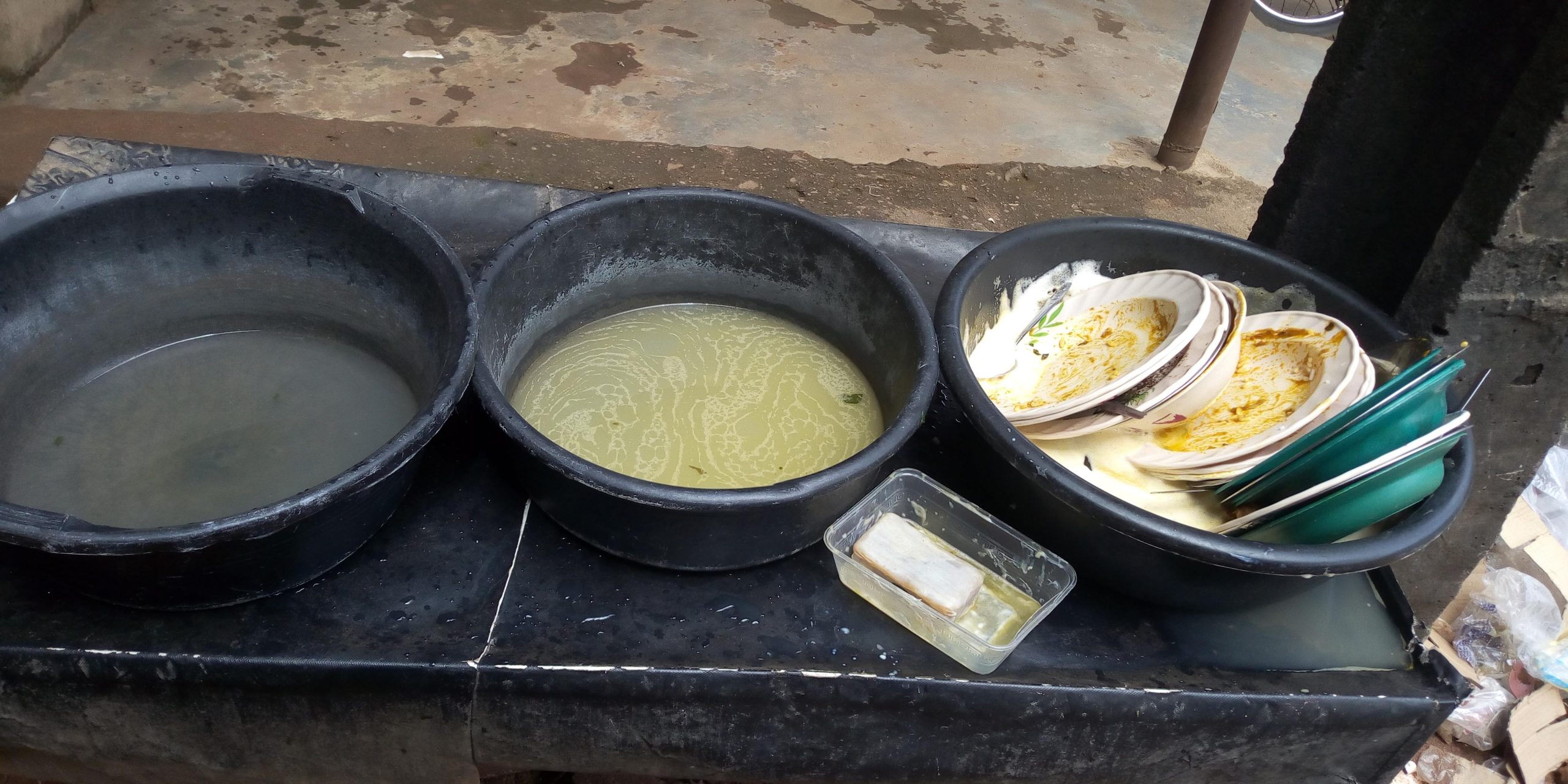Nnewi (Anambra State) — The sun is dressed in her best attire on Tuesday morning, after the heavy rains at night, to welcome resilient traders and businesspersons who are about their duties despite the weather changes. Hooting horns from motorcycles are the most familiar sounds anyone will hear in Nkwo Nnewi ultramodern market, the largest vehicle spare parts market in West Africa, popularly referred to as Nkwo.
As early as 7:30 am, as traders open their shops, a young food vendor at the electrical parts section is seen surrounded by people, mostly men. Not long after, they start to leave, one after another, with food in plates, bowls and warmers of different sizes. The rest take turns on a bench to relish their plates of rice with pepper soup or palm kernel sauce (Ofe Akwu). Simply known as Mama Chimezie, the food vendor, in her late thirties, has been in business with her mother for about 15 years, and recently took over. With her experience and popularity in the market, one would expect her to know more about basic food safety and hygiene. A conversation with her and other food vendors sheds light on the extent of epidemic preparedness in South East Nigeria.
“I wash my hands regularly inside a bowl. When my customers come, they fetch water from us and wash their hands with our bowl,” Mama Chimezie says, when asked about hand hygiene habits. She also affirms that she is aware of some food-borne diseases like typhoid, but not pathogens. “I don’t know about Salmonella, but I know about typhoid. Is there anyone in Nigeria who has not suffered from Typhoid disease before?” Another topic was how she preserves any food remaining from the day. “If I am unable to sell all my rice in a day, I soak it in water and leave overnight, then sieve out the next morning and warm it. I believe it is the best because sometimes there is no electricity to refrigerate it.
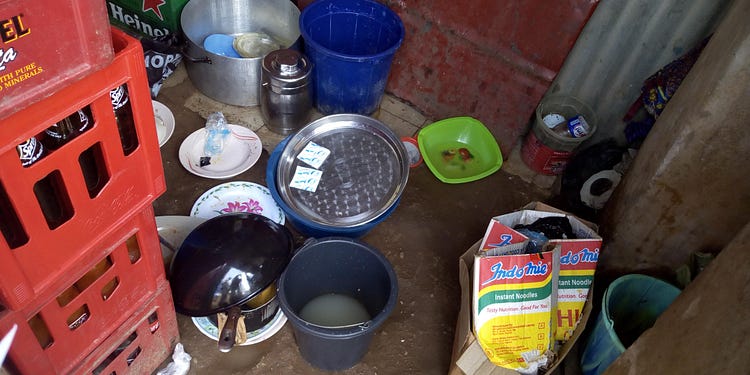
Although some food vendors did not want to engage for fear they may be speaking with someone from the health task force, one common insight drawn from the conversations with Mama Chimezie and other food vendors was that though electricity supply had improved a little in Nnewi town, the lack of running water within the market was a concern. They purchased water in 20-litre gallons from a seller near the market for washing and cleaning during and after the day’s trade.
Also, the health seeking behaviours of these vendors tell a different story. “I often suffer from ordinary malaria. When I do, I go into the farm, fetch some herbs, boil them, drink and use them to bathe. Leaves of mango, pawpaw, or Dogon Yaro, work well. If I am really sick, I go to the hospital. Otherwise, Jesus heals me. ” says 51- year-old Mrs. Anazodo, who has been in the food business for 22 years. Fifty-seven-year-old Mrs. Okeke, popularly known as Mama Doctor, who sells roasted foods like yam and plantain, only undergoes regular health checks because her son insists she does.
Economic and Public Health Burdens of Food-Borne Diseases
Globally, one in ten people fall ill after eating contaminated food. The World Health Organisation (WHO) estimates that unsafe food contains harmful pathogens and/or chemical substances that cause over 200 diseases, ranging from diarrhoea to cancer. These result in an estimated 600 million cases annually, and 420,000 deaths globally. Children account for 40% of these deaths.
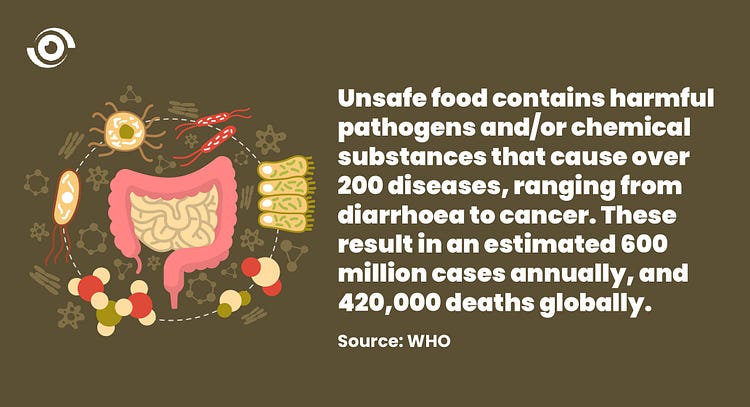
In Nigeria, recent reports by joint external evaluators show a 40% level of compliance towards food safety. The World Bank estimates that Nigeria and other countries, altogether lose $110 billion yearly to food-borne diseases, thus impeding socio-economic development by straining healthcare systems and harming national economies, tourism and trade. These funds are lost through lost productivity and medical expenses annually. Although these diseases are under-reported, it has been reported that 200,000 Nigerians die of food poisoning annually, due to food contamination by improper processing, preservation, and service.
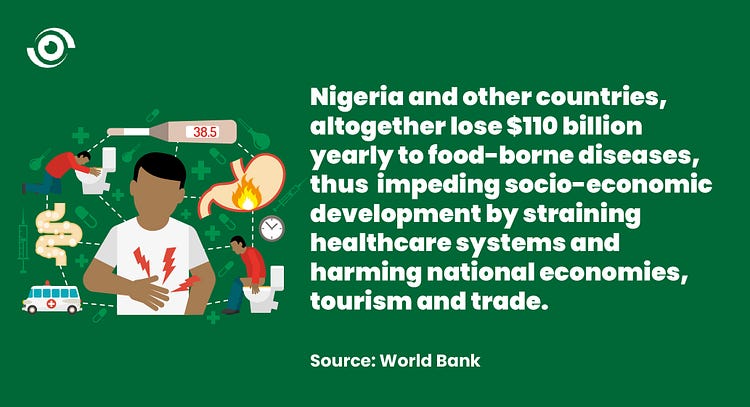
Poor Hygiene and Food-handling: Who is at risk?
Like all businesses, food vending is an essential service set up to make profits. Since all Nigerians need food, proper food handling is key for all to have access to safe and nutritious food to sustain life, reproduction and promote good health. Unsafe raw food, poor storage conditions, inadequate cooking, poor personal hygiene, and improper handling methods are sources of contamination that give room for food-borne outbreaks. Food-handlers with poor personal hygiene could be potential sources of infections by food-borne pathogens (Hepatitis A, Salmonella species, E.Coli, Vibrio species, and Listeria) transmitted through food, water, nails, fingers and fecal contamination. Compared to other parts of the hand, the Journal of Food Protection reports that the area beneath fingernails harbours the most microorganisms and is most difficult to clean.
Poor hygiene habits create risks for food vendors’ clientele: attendees at events, traders, customers, passers-by to the office, and bank workers who buy at least one meal from them daily. The 2019 report on Consumption Expenditure Pattern in Nigeria published by the National Bureau of Statistics show that about 57% of total household expenditure of Nigerians was spent on food, with food consumed outside the home responsible for the largest proportion (20%) of these food expenses. These expenses and consumption patterns also vary from one zone to another, as well as the levels of urbanization, with urban areas spending more on food (43%) than those in rural areas (38%). Hypothetically, in urban areas, the working class Nigerians are more at risk of food-borne diseases, as most regularly eat outside their homes to meet a schedule that keeps them up early and brings them home late. These urban adults depend on food from street vendors like Mama Chimezie because they are easily available, affordable and served fresh (hot). In an analysis of street food samples in Nigeria, over 26% contained Bacillus cereus, while 16% contained Staphylococcus aureus. In rural Nigeria, the 2018 Nigeria Demographic Health Survey (NDHS) highlights that food storage challenges may affect food quality, as only 10% of rural-dwellers own refrigerators, out of the 39% of households who have access to electricity.
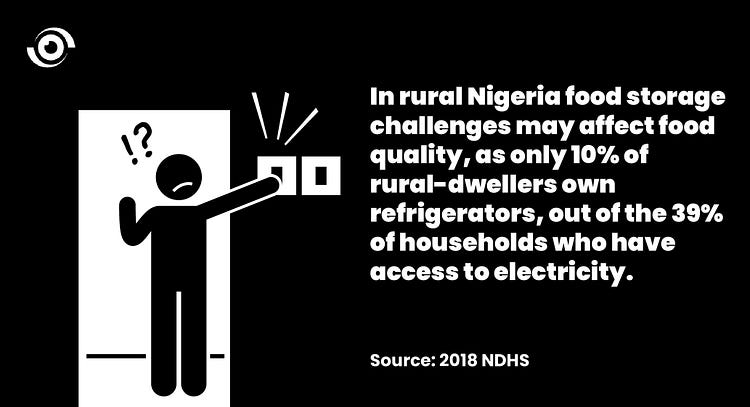
How Can Nigeria Prevent A Food-Borne Disease Outbreak?
An investigation into a food poisoning case at a burial ceremony identified that major constraints to an effective outbreak investigation in our environment are inadequate preparedness and lack of public health laboratories. Although Nigeria’s epidemic preparedness level has undergone a positive shift from 39% to 46%, our efforts with food safety have room for improvement.
At a national level, Nigeria’s National Action Plan on Health Security, developed by the Nigerian Centre For Disease Control and partners, requires sustained funding: an estimated 5-year cost of $2,622,819 (₦799,173,050) to strengthen food safety systems and food laboratories, surveillance of food-borne diseases, to build human capacity to conduct and lead food outbreak investigations and leverage partnerships with the national legislators, organisations, agencies and stakeholders related to food security, are strengthened. Also, the National Food Drug Administration and Control Agency needs to partner with stakeholders at the state and local levels. “We need a massive awareness and sensitisation campaign that involves community, social, veterinary, and environmental health workers, rural health task force teams, market, church and traditional leaders, farmers, food vendors and suppliers. All food vendors and hotels must be registered, tested, trained and certified,” opines Mr. Adamu Yusuf Degri, Medical Laboratory Scientist at Federal Teaching Hospital, Gombe.
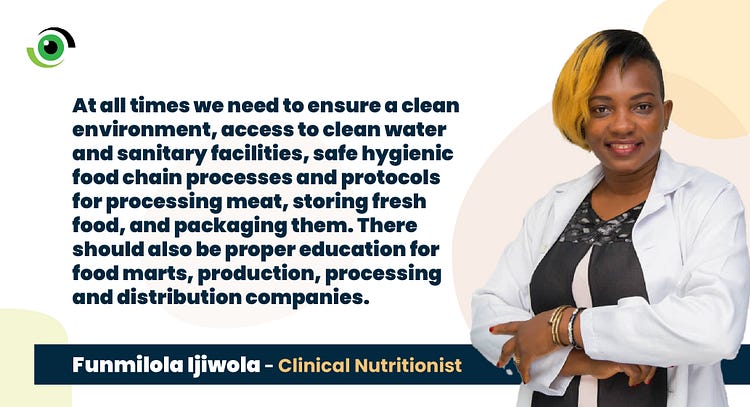
For Nigeria to achieve food safety, Mrs Funmilola Ijiwola, a Lagos-based clinical nutritionist suggests that all mediums that fuel food-borne epidemics must be addressed. “At all times we need to ensure a clean environment, access to clean water and sanitary facilities, safe hygienic food chain processes and protocols for processing meat, storing fresh food, and packaging them. There should also be proper education for food marts, production, processing and distribution companies.”
Basic hygiene and sanitation will take Nigerian food vendors and consumers further than a million doctors would. Food vendors can do better to keep all Nigerians safe. One sure thing, to begin with, are the words of Olabimpe Ajibola, CEO of Ivie’s Kitchen and a food business consultant certified in food safety: “All food vendors need to prepare, package and deliver their services as though the customers were watching, every step of the way.”


